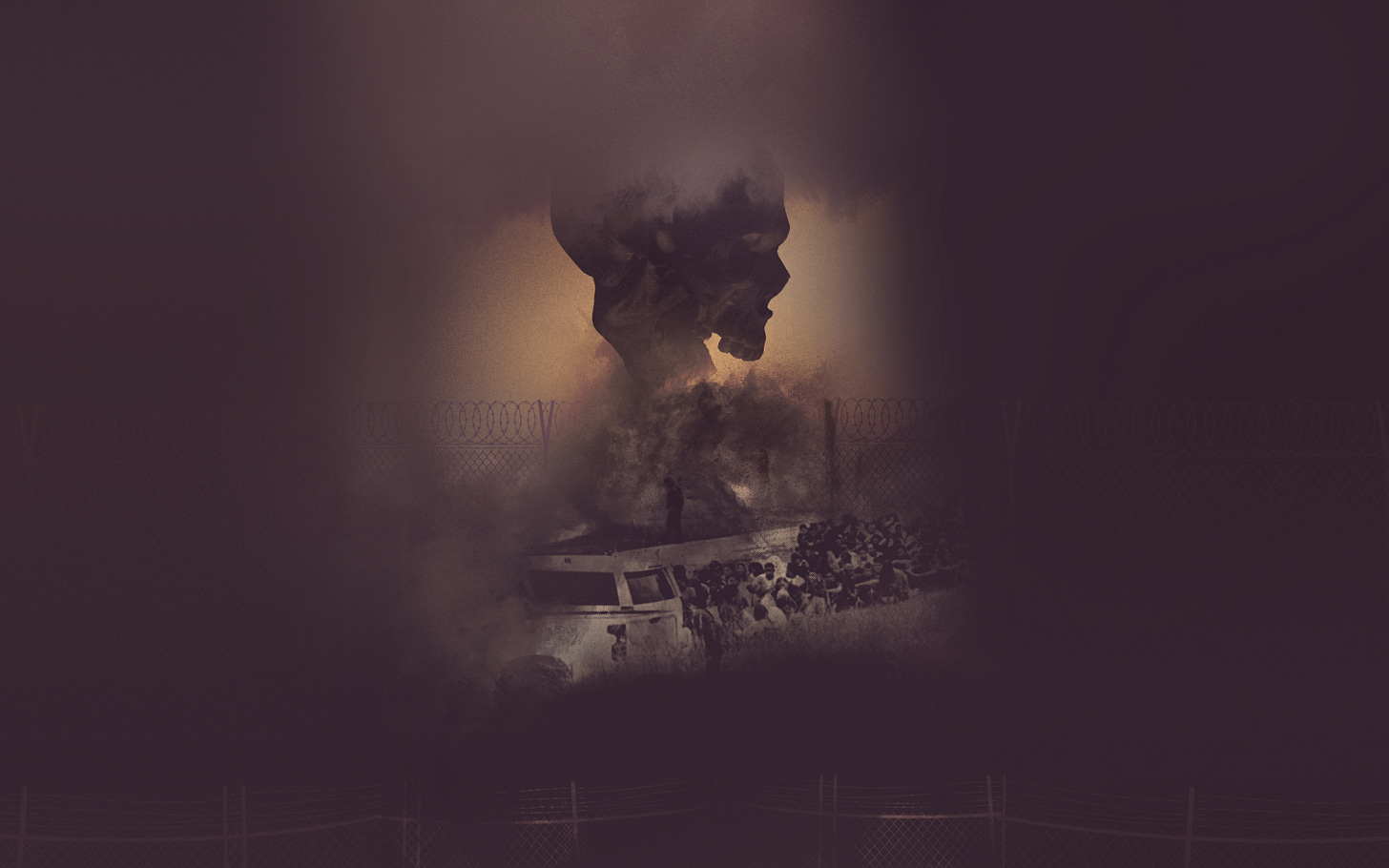Surplus Suffering
The Plight of Asylum-Seekers at the US-Mexico Border
❝ In the end, it is the figure of the migrant, the uprooted and expelled, which has become emblematic of contemporary globalization… ❞
— Mike Davis
Surplus Suffering: The Plight of Asylum-Seekers at the US-Mexico Border
by taller ahuehuete
✎ Reading time: 7 minutes
Rafael Mendoza, a 27-year-old Venezuelan national, and his relatives — four brothers, a sister, and an uncle — had been residing in makeshift tents on the banks of the Rio Bravo when a blaze engulfed the area, destroying dozens of temporary dwellings. In response to the perceived threat to their safety, they hastily swam across the river, battling against the elements to reach the other side of the frontier. Their relief was short-lived, however, as they encountered Border Patrol agents instantly.
Exhausted, hungry, and caked in mud after enduring five days without food, Mendoza's experience is just one of many thousands on the border.
Reports from Andrea Rudnik, a volunteer coordinator for local non-profit organization Team Brownsville, reveal that up to 1,000 migrants are apprehended daily by border police in Brownsville, Texas1. As the influx of asylum seekers continues, advocates have increased efforts to provide much-needed supplies such as food, water, and toiletries. The situation has become especially dire for those awaiting asylum in Matamoros, Mexico, as resources dwindle and the season of high temperatures initiates.
Of Walls and Woes
The US-Mexico border is a poignant landscape for the plight of millions seeking to improve their material conditions. In the words of Mike Davis, “today, the role of the border is still to reinforce the extra-economic coercion of immigrant labor in the non-union sectors of the U.S. economy.” The zone is one of the most heavily armed frontiers in the world between two nations not at war with each other. Regardless, automated surveillance of key sectors with seismic sensors, capable of detecting even the slightest footstep, and military infrared night-scopes were introduced with the help of the Pentagon. The focus of the War on Drugs shifted from Colombia and other Andean countries to the Mexican border, where the US military, including elite Marine reconnaissance units, assists the Drug Enforcement Administration and Border Patrol. The distinction between immigration control and narcotics interdiction, or between policing and low-intensity warfare, has blurred to the point “that border-dwellers speak routinely of the ‘war against drugs and immigrants2’."
Harsh policies to discourage and restrict migration were implemented by the United States. Under Trump's administration, the United States enforced the Remain in Mexico program, also known as the Migrant Protection Protocols (MPP), in 2019. The policy compelled US asylum applicants to linger for the resolution of their petitions in Mexico, rather than on American soil. Thus, individuals were required to stay in border cities, notorious centers of violence related to drug-trafficking narco-operations, for several months or even years before being allowed to enter the United States to attend their immigration court hearings.
Capitalism relies on a global reserve army composed of workers who are constantly in transit and can be recruited and discarded. The notion of surplus population is a critical lens through which to understand the dynamics of capitalist societies. These require a certain level of unemployment or underemployment to maintain low wages and discipline their workforce. Migrant labor is one method in which surplus value is extracted. Undocumented work is utilized in dangerous conditions and paid inferior wages than those of documented workers. Asylum seekers who are required to remain in Mexico until their court hearings are not legally permitted to work, leading to limited means of financial support.
According to the El Mañana newspaper, the United States plans to terminate Title 42 on May 12, which allowed for the rapid expulsion of undocumented migrants due to Covid-19. However, individuals caught crossing without proper documentation will be apprehended under Title 8, which imposes long-term consequences for those who attempt to enter the United States without legal grounds, including the prohibition of future entry for at least five years and exclusion from asylum programs without exception. This measure aims to curb the influx of undocumented migrants at the southern border, which has seen a surge of attempted crossings.
During his election campaign and initial months in office, AMLO championed free transit for expatriates, promising them employment and a legal residency pathway should they wish to stay in Mexico. He also criticized the construction of a border wall and condemned the use of violence against asylum seekers, referring to them as "our siblings.” The US government threatened to impose tariffs on all goods entering US territory if Mexico continued to adopt such policies, prompting AMLO to reverse his stance. The National Guard was subsequently dispatched to Mexico’s southern border to form a barrier against Latin American migration, and the government ceased discussing support and work opportunities for migrants. Currently, only documented residents from Canada, Chile, Colombia, Japan, Peru, the United States of America, the United Kingdom, or the Schengen Area are exempt from requiring a Mexican visa.
Ubaldo Oropeza argues that Mexico has overtaken the United States in deporting Central Americans from borders worldwide. The lack of access to legal channels for employment authorization is a noteworthy hindrance, given that the informal economy represents 57% of employment in Latin America and is responsible for creating 80% of new jobs. According to Mike Davis, the only job growth in Mexico between 2000 and 2004 was observed in the informal sector.
❝ During his election campaign and initial months in office, AMLO championed free transit for expatriates, promising them employment and a legal residency pathway should they wish to stay in Mexico.
He also criticized the construction of a border wall and condemned the use of violence against asylum seekers, referring to them as "our siblings.” The US government threatened to impose tariffs on all goods entering US territory if Mexico continued to adopt such policies, prompting AMLO to reverse his stance.
The Informal Economy
Mexico's informal economy has contributed significantly to the country's GDP, i.e., accounting for approximately 60% in the final quarter of 2011 and 59.1% in the second quarter of 2013, according to the National Statistics and Geography Institute (INEGI). However, working without proper documentation in Mexico can lead to detention, deportation, or fines, and undocumented workers from Central and South America are often targeted by federal police. Furthermore, Mexican law provides limited protections for undocumented workers and does not allow them to join labor unions.
Despite the growth of border maquiladoras and the expectations surrounding new «job opportunities», the Mexican State's role as gatekeeper for the United States did not improve living conditions for the Mexican populace. It hardly needs to be added that nations emerging from the denominated Global South have survived global competition only "by inflicting major reductions of living standards on their populations”3.
The lack of reciprocity in the United States-Mexico-Canada Agreement (USMCA) is not surprising, given the historical precedent set by the North American Free Trade Agreement (NAFTA), or any free trade model involving similar actors. The elephant in the room suddenly transforms into a stampede. What is free trade? Freedom for capital. So long as the relation of wage labor to capital exists, it does not matter how favorable the conditions under which the exchange of commodities takes place, there will always be a class that will exploit and a class that will be exploited4.
In terms of fraternal relations, what does free trade offer? The notion that global exploitation is a manifestation of universal brotherhood can only have emanated from those who watch from the sidelines, consuming their cake while the smallest crumbs are hotly contested. As delineated by Davis5,
"In Mexico, the population in extreme poverty increased from 16 percent in 1992 to 28 percent in 1999, despite the much-hyped success stories of the border maquiladoras and NAFTA.
Global inequality, as measured by World Bank economists across the entire world population, reached an incredible GINI coefficient level of 0.67 by the end of the century, [...] equivalent to a situation where the poorest two-thirds of the world receive zero income, and the top third receives everything."
Accumulation and dispossession are in inverse proportion to the aforementioned crumb-to-cake relation. The great beauty of capitalist production consists in this — that it not only constantly reproduces the wage worker as a wage worker, but produces always, in consonance with the accumulation of capital, a relative surplus population.
Sandra Sanchez, for Border Report.
Davis, Mike. Magical Urbanism: Latinos Reinvent the US Big City. Verso, 2000.
Brenner, Robert. The Economics of Global Turbulence: The Advanced Capitalist Economies from Long Boom to Long Downturn, 1945-2005.
Marx, Karl. On the Question of Free Trade, 1848.
Davis, Mike. Planet of Slums. Verso, 2006.





